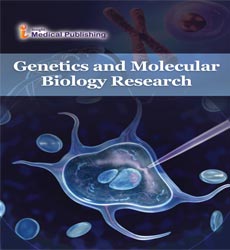Applications of Genomics and Proteomics
Department of Biotechnology, Sreenidhi Institute of Science and Technology, India
- Corresponding Author:
- Mohammed Abdul Kabeer
Department of Biotechnology
Sreenidhi Institute of Science and Technology, India
E-mail: makkabeer01@gmail.com
Received Date:July 27, 2020; Accepted Date: August 25, 2020; Published Date: September 1, 2020
Citation: Kabeer MA (2020) Applications of Genomics and Proteomics. Genet Mol Biol Res Vol No: 4 Iss No: 3:32
Copyright: © 2020 Kabeer MA. This is an open-access article distributed under the terms of the Creative Commons Attributions License, which permits unrestricted use, distribution and reproduction in any medium, provided the original author and source are credited.
Keywords
Genomics; Proteomics
Introduction
The information and understanding obtained from genomics research can be applied in various settings, including medicine, biotechnology and social sciences.
Proteomics is used to detect protein expression patterns in response to a stimulus at a particular time, and also to determine functional protein networks existing at the level of cell, tissue, or whole organism.
Applications of Genomics
Medical applications
• Oral plant vaccines which stimulate immunity on consumption, uses DNA and transgenes to create surface antigens, are found to be promising in immunizing humans against hepatitis B.
• the risk of malaria infection is expected to be reduced up to 80%, by Two-part vaccines with DNA from P. falciparum followed by modified Ankara virus.
• The chemicals fosmidomycin and FR-900098 are being tested for their targeted effects in inhibiting DOX reductoisomerase in the body, which is involved in the lifecycle of P. falciparum, the most dangerous of the parasites that can cause malaria.
• Genetic counselling as a result of the screening test has reduced rates of thalassemia in Sardinia from 1 in 250 to 1 in 4000 live births.
Biotechnology applications
Genomics have several applications, in the field of synthetic biology and bioengineering. Researches have demonstrated the creation of a partially synthetic species of bacteria. E.g. Mycoplasma genitalium genome was used in synthesizing Mycoplasma laboratorium bacterium, which is found to have distinct features from the original bacteria.
Social science applications
Conservationists use genomic sequencing data to evaluate key factors which are involved in conservation of any species. This data can also be used to determine effects of evolutionary processes and picking up genetic patterns of a specific population, which can further help to devise plans to aid the species and enable it to thrive into future.
Applications of Proteomics
Proteomics in medicine
• Proteomics was first utilized by Cancer Biologists for diagnostic and prognostic purposes. E.g. for ovarian cancer detection, a serum-based proteomic pattern diagnostics has been developed which represents a new method of diagnosis and disease identification.
• Protein-sequence data which is now available for various microorganisms, which leads to give understanding about their resistance to antimicrobial drugs and also for identifying novel agents for treating drug-resistant disease. Surface-enhanced laser desorption/ionization-time of flight (SELDI-TOF) is currently used to rapidly diagnose tuberculosis, sleeping sickness, invasive aspergillosis, and Chagas' disease.
• Further advancements in proteomics have allowed detailed investigation of molecular mechanisms behind cardiovascular disease, facilitating not only the identification of modified proteins, but also the nature of their modification.
• Proteomics is also turning into a part of quality control process which aims to verify the identity, safety, efficiency and purity of various blood products in transfusion medicine.
• Proteomic approach is an important way to implement the global screening of storage-related lesions of red blood cells and to study the mechanism of biological consequences on transfusion recipient.
Proteomics in drug development
• Proteomics plays a very effective role in a drug development platform, as disease mechanism and treatments are often manifesting at the protein level.
• Almost all pharmaceutical companies now have a proteomics division. Uses of proteomics in drug industry mainly includes target identification and validation; identification of biomarker efficacy and toxicity from easily attainable biological fluids; and investigations into mechanisms of drug action or toxicity.
• Proteome mining is used to discover new antimalarial drugs which targets purine binding proteins in the blood stage of infection.
• Major top-selling drugs currently are either proteins or they act by targeting proteins. Evolution of proteomics may help to create personalized medications for individuals, for better effectiveness and fewer side effects.
Open Access Journals
- Aquaculture & Veterinary Science
- Chemistry & Chemical Sciences
- Clinical Sciences
- Engineering
- General Science
- Genetics & Molecular Biology
- Health Care & Nursing
- Immunology & Microbiology
- Materials Science
- Mathematics & Physics
- Medical Sciences
- Neurology & Psychiatry
- Oncology & Cancer Science
- Pharmaceutical Sciences
